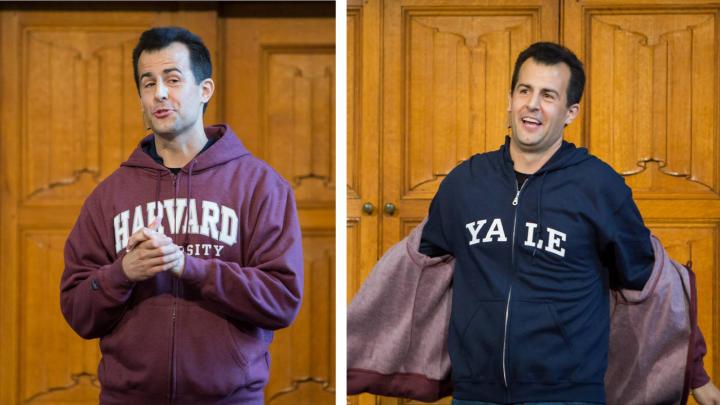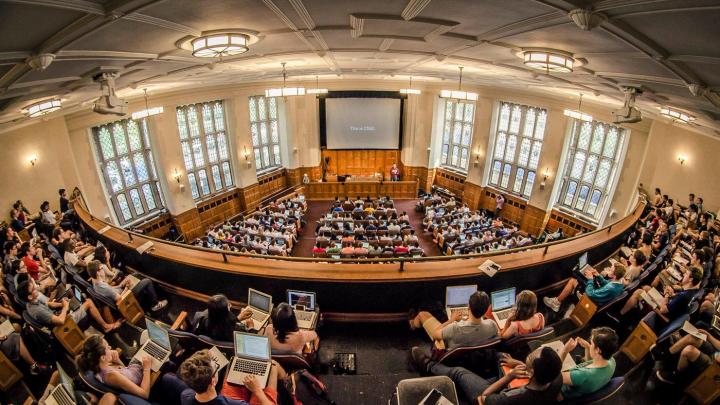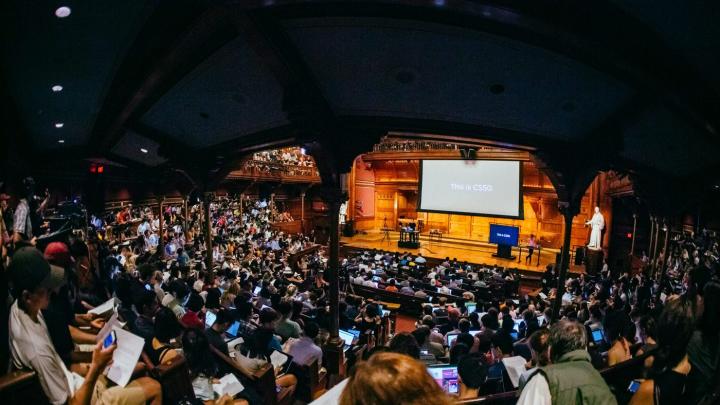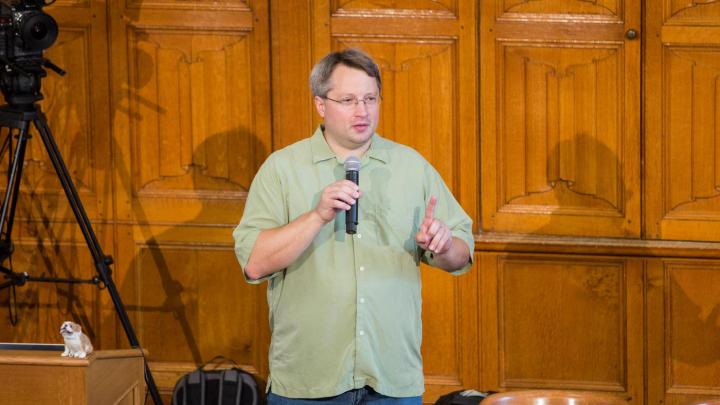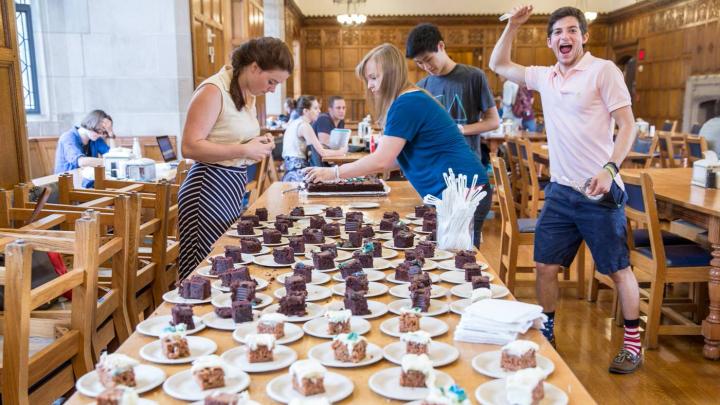“Are we ready? Let’s do lights.” With those words from Yale professor Brian Scassellati, the room went dark, and the hundreds of students who’d swarmed through the aisles of the Yale Law School auditorium focused on the screen up front. There, an unexpected ambassador appeared: a live-streamed DJ in a pink tank top and sunglasses, standing in front of a projector screen in Harvard’s Sanders Theatre, reading “This is CS50.” As the words faded, Mark Ronson’s “Uptown Funk” began to blast: “Girls, hit your hallelujah.”
Moments earlier, Scassellati had called CS50’s presence at Yale “a grand experiment in education.” Students on both campuses would watch the same lectures (most of them offered by Harvard’s McKay professor of the practice of computer science David Malan), in addition to meeting in person during events like Puzzle Day and a hackathon. Ever since their faculty voted in favor of the collaboration last November, Yalies had debated whether a joint venture with their supposed arch-rival could save the underdeveloped computer-science department’s reputation.
By the first day of the fall semester on September 2, more Yale students had signed up for CS50 than for any other university class. Flyers, starring a bulldog that sported a CS50 bandana, covered campus billboards; 2,000 students had been invited to the Facebook page “CS50’s First Lecture at Yale.” One course section was specially aimed at faculty members, who received a pitch e-mail with the bold opener: “Do you want to learn to program? Do you want to learn a new way to think?”
As sophomore Sam Kim puts it, “I’ve never seen a course with this much production value.” Kim, who was searching for a computer-science course to count toward his major in applied math, said he turned to his friend at the end of the first lecture to say, “This is kind of a circus!”
If so, it’s one that comes with toys—purple stress balls, T-shirts, prizes—and treats. “I was expecting shitty cake, because they’re feeding, like, 500 people. It was nice,” recalls junior Megan Ruan, a global affairs and cognitive science major.
During the first meeting, Harvard’s name elicited only a few knee-jerk hisses from the crowd, who’d been encouraged to think of themselves as part of a collaborative effort. “We’re going to shoot a selfie and we’re going to say hello to all of our friends in Cambridge,” Scassellati said, turning a camera on the crowd of wildly cheering Yale students. When the live-streamed Harvard lecture later included—somewhat uncannily—that recorded video, the Elis cheered at the sight, as though their five-minute-old virtual selves needed a fan base.
Evan Hellmuth, a senior computer-science major and a teaching fellow for the course, likens the governing attitude of CS50 to the “absurd but fun” start-up culture of Silicon Valley itself. A little too absurd, for some: “I’m not going to go to a party in the middle of the day,” quips John Barrios, a senior Latin American studies major enrolled in the class who’s opted to view the lectures on his own schedule. But even he has been caught up in its spirit: for the first assignment, he coded a computer game in which Yalies shoot “Fs” at Harvardians who’ve been turned into zombies by an alleged brain-enhancing pill. It’s all of part of the fun in a class where Malan’s first in-person appearance at Yale included a bit in which he unzipped his Harvard sweatshirt to reveal a Yale sweatshirt underneath.
Ironically, a course linking the rival universities seems to have split the New Haven campus into factions. Because all their friends are talking about it, even students not in CS50 (or even computer science) have weighed in on whether it’s worthwhile. Those who tried the course but decided not to enroll criticize the amount of time spent on what they see as mere entertainment; others, computer-science majors among them, deride it for being too simplistic. “Are you going to get a job at Google after you take CS50? Probably not,” Scassellati responds. “But it’s definitely a rigorous foundation.”
In the days following the first class, the course seemed to be at the center of many campus conversations, whether at the dinner table—“If you say ‘CS50,’ everyone knows—you don’t have to explain anything,” says Ruan—or on social media. The staff of Rumpus, a humor magazine, tweeted, “Yale Drama Coalition Presents: CS50”; a post on the Facebook page Overheard at Yale quoted a professor who described his higher-level computer science course as “not a Broadway show. That’s CS 50.”
The course informality extends to the approximately 40 undergraduates in matching grey CS50 T-shirts who’ve been trained to teach sections and grade the course material. On the first day, they were deployed as ushers on the street corner outside, directing shoppers indoors or pointing them to available seats. The rest of the time they functioned like walking billboards. One of the group, junior computer-science major David McPeek, says the marketing strategy was meant to dispel the belief that the class was just “watching YouTube videos on the monitor.” Scassellati and the team leading the course—including lecturer Jason Hirschhorn and head TF Andi Peng—emphasize that most of the learning will happen when students go to office hours and sections, and work with their peers.
Two weeks later, enrollment numbers are on their way down, as students face the reality that the problem sets demand an estimated 10 hours of work per week. Others can’t get on board with the live-streamed, online component. Ian Garcia-Kennedy, a sophomore economics major who’d bought the textbook even before the course started but has since returned it, says he was skeptical of the focus on undergraduate teaching: “That’s the same as asking my suitemate for help. ” But the course still has 513 students enrolled (down from 675), forcing the staff to turn many of their course assistants—initially hired for administrative duties, such as running events and office hours—into section leaders.
Looking ahead, teaching fellow McPeek suggests, “The hype will change, and I think when people get down to business and realize how difficult the course is, it’s going to be a very different thing. That’s where the energy is going to be—in the students themselves—not in the DJ, or in David Malan. The energy is going to be very focused, and a little bit stressed.”
Still, with electronic music playing at the start of each lecture, CS50 keeps up the party: “The DJ’s always memorable,” says Ruan. Because he’s in Cambridge, she plans to watch him from the comfort of her room, her preferred place to take in lectures—and from which she sends the occasional Snapchat, captioned: “CS50, brought to you from my bed.”
